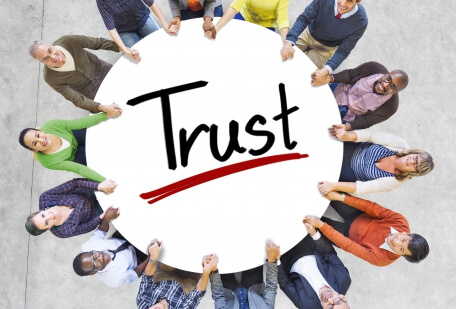6 Ways Teamwork Teaches Trust

No one trusts a simple handshake anymore. Agreements involve thick stacks of legal documents. Everywhere we look reveals a lack of trust in the world. Trust is important not just in our personal lives, but also in the workplace. When sales people do not trust each other or their managers, all sorts of problems start to arise: collaboration and communication stagnates, innovation ceases, employee engagement declines, productivity falls, and spending time in the workplace becomes unbearable.
Cultivate your teamwork skills and you will find your aptitude for trust comes more naturally. Discover these six trust-building results that arise from developing a strong team in the office.
1. Strengthen Communication
Practicing teamwork builds strong verbal and nonverbal relationships among coworkers. When working together on team projects, you must learn how to communicate clearly and compile the entire group’s ideas in order to build trust.
When coworkers work together, honesty becomes a byproduct of the interaction. Lying and deception prevent the team from reaching goals. Effective teams quickly learn to open up and share honest opinions to resolve disagreements. A successful team knows always to tell the truth, no matter how difficult. Putting forth constructive criticism gives your coworkers honest, helpful feedback they can utilize to increase their skills. This straightforward communication leads to a solid professional relationship rooted in trust.
Over time, you learn to communicate instinctively with one another by reading body language and tone. Understanding a peer’s posture allows you to read his or her immediate response to your conversation. Once you discern how to read your coworker’s nonverbal cues, your team interactions will become easier. A team that learns to communicate well even without words enjoys an added, implicit sense of trust.
2. Learn to Respect Each Other
Team members take other people’s feelings into consideration when working together. Developing this respect for emotions and learning to value the opinions of others is an important aspect of teamwork. If you join a team and lack this respect, communication will break down quickly, leading to arguments within the group. Understanding and appreciating where a coworker is coming from helps you cement a solid base of trust between each other and throughout the team.
3. Rely on Others for Problem Solving
Working on a team means relying on other people to solve the bigger problems. Trusting others with the responsibility of completing part of the project may be difficult at first, but a strong team will develop this trust naturally over time. Depending on others also teaches you to get along and work in conjunction. By contributing to something bigger than yourself, you learn to focus on shared, rather than personal, goals. This complete view of the big picture helps sales teams build off each other’s skills and become well-rounded individuals.
4. Clearly Define Strengths and Weaknesses
Teamwork teaches you to understand your own limits and how someone else can contribute. Collaborating in a group reveals what you bring to the table and highlights your strengths. You may struggle in one area, but by working in a team, you can see how your coworkers perform and pick up helpful tips to improve any weakness you may have. Teamwork inherently forces employees to share knowledge openly. This leads to a stronger sales team that knows and trusts the individual strengths of each member.
5. Promote Openness
Group members have to be willing to get to know one another, particularly those with different interests and backgrounds. Team members become open to new ideas, diverse viewpoints, and the variety of individuals present within the group. They listen to others and elicit their ideas. Knowing how to balance the need for cohesion within a group with the need for individual expression can be challenging for team members, but developing this skill is imperative for a successful team. Working together as a team fosters open-mindedness, and open-mindedness leads to trust.
6. Improve Active Listening Skills
Simply put, you cannot establish trust in a group without being patient and listening to your peers. Team effort is not about who has the loudest voice; it is about weighing the opinions of everyone involved to bring forth the most effective results. Let others talk and listen intently to what they have to say, instead of just waiting for your turn to speak. Once group members feel that you value their opinions, a reciprocal team relationship develops: Others will be willing to trust your ideas if you show them the same patience and trust.
Active listening involves listening to others, processing the information put forth, and responding in a thoughtful, honest manner. Teamwork sharpens listening skills and teaches employees to appreciate what others have to say, instead of automatically assuming that their own opinion must be correct. Attentively listening to your teammates’ ideas is the start of a reciprocal, trusting relationship.
If building trust within your workplace is important to you, try using team projects to instill these skills in your employees. You will quickly discover that teamwork results in better communication and interactions within your group. Work together to improve your office environment and develop stronger professional relationships in the workplace.








